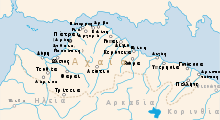
Aegae or Aigai (Ancient Greek: Αἰγαί[1]), also known as Aega or Aiga (Αἰγά), was a town and polis (city-state) of ancient Achaea, and one of the 12 Achaean cities.[2][3] It was situated upon the river Crathis and upon the coast, between Aegeira and Bura.[4]
One of the mentions of Aegae in Homer's Iliad points to this town.[5][2][a]
It was afterwards deserted by its inhabitants, who removed to the neighbouring town of Aegeira; and it had already ceased to be one of the 12 Achaean cities on the renewal of the Achaean League in 280 BCE, its place being occupied by Ceryneia.[2][6] Its name does not occur in Polybius.[2] Neither Strabo nor Pausanias mention on which bank of the Crathis it stood, but it probably stood on the left bank, since the right is low and often inundated.[2][7][4]
Its site is located near the modern Akrata.[2][8][9] The location of the ancient city has been excavated.[10]
YouTube Encyclopedic
-
1/1Views:1 175
-
Photos of Eastern Aigialeia, Peloponnese
Transcription
Explanatory notes
- ^ The other mention of Aegae, in Homer, Iliad, 13.21, points to Aegae (Euboea).[2]
References
- ^ Autenrieth, Georg (1891), "Αἰγαί", A Homeric Dictionary for Schools and Colleges, New York: Harper and Brothers
- ^ a b c d e f g
 Smith, William, ed. (1854–1857). "Aegae". Dictionary of Greek and Roman Geography. London: John Murray.
Smith, William, ed. (1854–1857). "Aegae". Dictionary of Greek and Roman Geography. London: John Murray.
- ^ Mogens Herman Hansen & Thomas Heine Nielsen (2004). "Achaia". An inventory of archaic and classical poleis. New York: Oxford University Press. pp. 478–479. ISBN 0-19-814099-1.
- ^ a b Pausanias. Description of Greece. 7.25.12.
- ^ Homer. Iliad. 8.203.
- ^ Herodotus. Histories. 1.145.
- ^ Strabo. Geographica. pp. 386–387.
- ^ Lund University. Digital Atlas of the Roman Empire.
- ^ Richard Talbert, ed. (2000). Barrington Atlas of the Greek and Roman World. Princeton University Press. p. 58, and directory notes accompanying.
- ^ www.in.gr
38°08′52″N 22°20′54″E / 38.1478°N 22.3484°E
